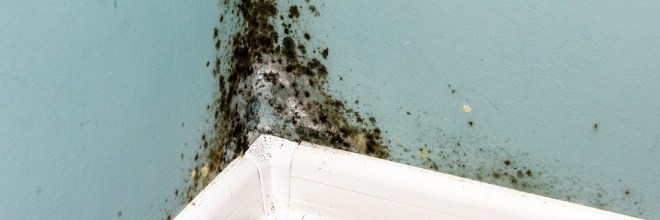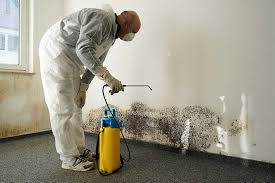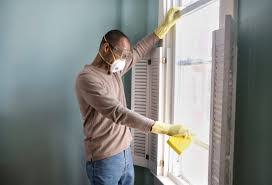How to Keep Mold from Coming Back
Fortunately for homeowners who’ve recently undergone mold remediation, there are preventive measures that you can take to help keep mold from growing back. Here are some proactive steps that you can take to keep mold away for good:
- Identify areas where there’s a moisture problem, and correct it. Basements and other areas prone to moist air can benefit immensely from the presence of a dehumidifier. For low-lying areas, sump pumps provide an additional line of protection by removing excess water automatically. Take note of any moisture you notice in your home. This can include dark spots on ceilings that indicate a leaky roof, or musty smells inside a closet. Fixing water leaks and replacing decaying wood can go a long way toward keeping your home free of unwanted fungi.
- Dry wet areas as soon as possible. If water gets into your home, remove it as soon as possible. For example, if you have water in your basement from a burst plumbing pipe or a heavy rainstorm, dry out the area immediately, before there’s time for mold to take root. Even seemingly mundane things, like leaving wet clothes in the washer for a few days, can be an invitation for mold.
- Keep out moisture with proper ventilation. Appliances that produce moisture, like clothes dryers and stoves, should vent outside. You should check your AC unit periodically to make sure it’s not generating moisture. If it’s leaking, dripping, or the coils are covered in condensate, you probably need to call an HVAC repair service.
- Use mold-resistant building materials whenever possible. This may not be possible in already existing homes, but if you’re remodeling, building an addition, or building a custom home, it’s a good way to stay one step ahead of mold. There are newer varieties of drywall and Sheetrock that are paperless– instead of gypsum covered with paper, they use fiberglass instead. This creates a highly water-resistant surface, and mold cannot break down and metabolize it. This is especially useful in bathrooms, kitchens, laundry rooms, and other areas where moisture is pretty much a given.
- Keep your indoor humidity between 30 and 60 percent. If your home is humid, and you notice a lot of water condensing near windows and pipes, consider using dehumidifiers.

Are Dry Mold Spores Harmful To Human Health?
People usually think that mold is harmless unless you touch it or eat it. However, because mold spores are microscopic in size, they can be easily inhaled, get trapped in our lungs, and cause a number of health problems.
There have been many studies conducted on the topic of mold and its potential health effects. Various agencies such as U.S. Centers for Disease Control and Prevention, the Institute of Medicine of the U.S. National Academy of Sciences, the World Health Organization and Health Canada agree that exposure to mold at home or at work increase the chances of getting a respiratory disease.
Since some molds produce allergens and others potentially toxic substances, inhaling the spores can cause:
- Allergic reactions
- Respiratory problems like asthma and wheezing
- Irritation of eyes, nose or skin
- Mental confusion
- Neurological problems
- Fatigue
- Headaches

Can Mold Cause Sleep Problems?
When you sleep, it is essential for your body to breathe as easily as possible. Otherwise, your brain has to focus harder on keeping you breathing, lowering the quality of your sleep. As a result, people who sleep in bedrooms with mold may suffer from the following sleep problems:
- Snoring refers to any sort of noisy breathing during the night. Snoring may not wake you up, but it can cause insomnia for your sleeping partner, and it is an indication that something is disrupting the quality of your sleep. Snoring can also cause dry mouth.
- Sleep apnea is a serious form of sleep-disordered breathing where the individual literally stops breathing momentarily during sleep, resulting in a loud gasping or snoring sound while their brain catches their breath. Obstructive sleep apnea occurs from a blockage or narrowing of the airways, as can happen from the nasal congestion associated with mold exposure.
- Insomnia describes a difficulty falling or staying asleep. If you are dealing with wheezing, watery eyes, or a runny nose from mold, you may have trouble falling asleep. Meanwhile, the congestion you experience may make it difficult to stay asleep. Either way, being exposed to mold in your bedroom can result in insomnia, and prevent you from getting a full night of restful sleep.
- Sleep deprivation refers to the physical, mental, and emotional state a person is in when they have missed out on a night of full sleep (defined as 7 hours or more for adults) on a temporary or chronic basis. When we’re sleep-deprived, we’re moodier, less focused, and at increased risk of social isolation and health conditions like diabetes, obesity, and cardiovascular disease. Sleep deprivation can also occur if you are ostensibly getting enough sleep, but the sleep is not high-quality, as can be the case when you’re snoring or experiencing apneas due to mold exposure.
- Daytime fatigue is one of the most recognizable signs of sleep deprivation. When a person is fatigued, they have lower energy and motivation, and their productivity and emotional well-being suffer.

The following are the benefits of mold removal and remediation.
1. Stop the Spread
Hire these professionals. They will come to your house and they will find where the water is leaking into your home or commercial building. They will stop the source of the fungus. So, they can help you stop the spread of the mold in your home or commercial building.
2. Remove the mildew
If you are always busy and you do not have the time to do the work yourself, hire professional removal and remediation services. They have the right equipment for this job. They are experienced so they take a short time to remove all the mold in your home. And they do not charge a lot of money.
3. Drying and Cleaning
Hire professional mold removal services because they have proper equipment for cleaning and drying faster. They prevent the mold from growing faster in your building. I’ve personally used Water Damage Pro who serve all of Hampton Roads area.
4. Education Regarding Mold Damage
How do you prevent mold from growing in your home? You prevent mildew and fungus from growing. Fungus and mildew like damp, hot, and humid places. So, keep the moisture out of your home and keep the keep humidity below 40 percent.
5. Increase Value of Your Home
Hire a professional inspector to inspect your house. If mold is growing in your house, get rid of it immediately. And more importantly, get rid of the source!
Removing Mold With Foggers
Mold bomb foggers and certain mold aerosols are effective at eradicating the accumulated spores. In addition, the fogger is great for treating areas that are hard to reach. If you only have a mold problem, a smaller mold fogger in the form of an aerosol spray may do the trick.
However, you might not be able to mold that invades a large area of your home with commercial mold foggers. Serious mold infestation usually requires a cold fog machine. Don’t hesitate to contact a mold removal company if you suspect that some materials in your house have been damaged beyond repair.
For mild invasions and mold prevention, feel free to use over-the-counter mold bombs in any room of the house. They are also a good solution for removing spores from different types of furniture, wooden decks, and walls (drywalls included).
In addition, regular mold bomb foggers work great for killing spores that appear in your car, RV, and window sills. And besides eradicating the spores, they also aid in killing the bacteria and viruses that may come with mold.